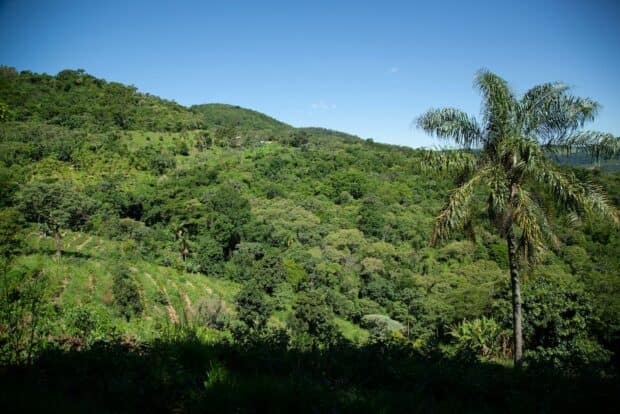[[{“value”:”
An agricultural and forest landscape and Brazil. Image not directly associated with the study mentioned below.
The results of a five-year multi-location field trial in Brazil suggest that robusta grown at high elevations might be a suitable replacement for arabica, which is facing existential threats on a global scale due to climate change.
Specifically, the research explored the “phenotypic plasticity” of the robusta species, using different field sites and elevations to determine how plants might fare and adapt to specific environments.
Many coffee breeding programs — both public/noncompetitive and private — remained focused on producing climate-resilient cultivars of the more sensitive arabica species, which is generally considered to produce higher-quality and more complex coffee than the more resilient and higher-yielding robusta.
Yet the researchers in this case reinforce the notion that robusta should be considered a serious candidate to replace or augment existing arabica systems.
Arabica currently represents approximately 60% of the global market by volume, yet study after study has found that climate change is dramatically reshaping the map of where coffee can be grown.
Related Posts
“Overall, the [robusta] species produces more coffee than Arabica, using fewer inputs, such as fertilizer and water,” Felipe Ferrão, a University of Florida horticultural scientist and study co-author, said in an recent UF announcement. “While the demand for Robusta coffee likely won’t decrease, our biggest challenge is to meet the demand for quality and productivity required by the coffee chain. In this sense, genetics and breeding studies can provide basic elements for a better understanding of diversity and factors that affect quality.”
Ferrão and fellow researchers from France (RD2 Vision) and Brazil (Incaper Institution) conducted the multi-location robusta trial to explore the question of how climate affected the phenotypic plasticity of robusta.
Importantly, the explored how robusta quality was affected by higher elevation and colder weather. It also notably emphasizes the potential for molecular breeding in addressing coffee’s long-term existence.
The researchers wrote, “Altogether, we present an emerging view on how C. canephora (robusta) could be a valid alternative for climate-smart cultivars in a projected scenario of altered climatic conditions.”
The full study was published in early July in Crop Sciences, the journal of the Crop Sciences Society of America (CCSA).
Comments? Questions? News to share? Contact DCN’s editors here.
Nick Brown Nick Brown is the editor of Daily Coffee News by Roast Magazine.
“}]]


